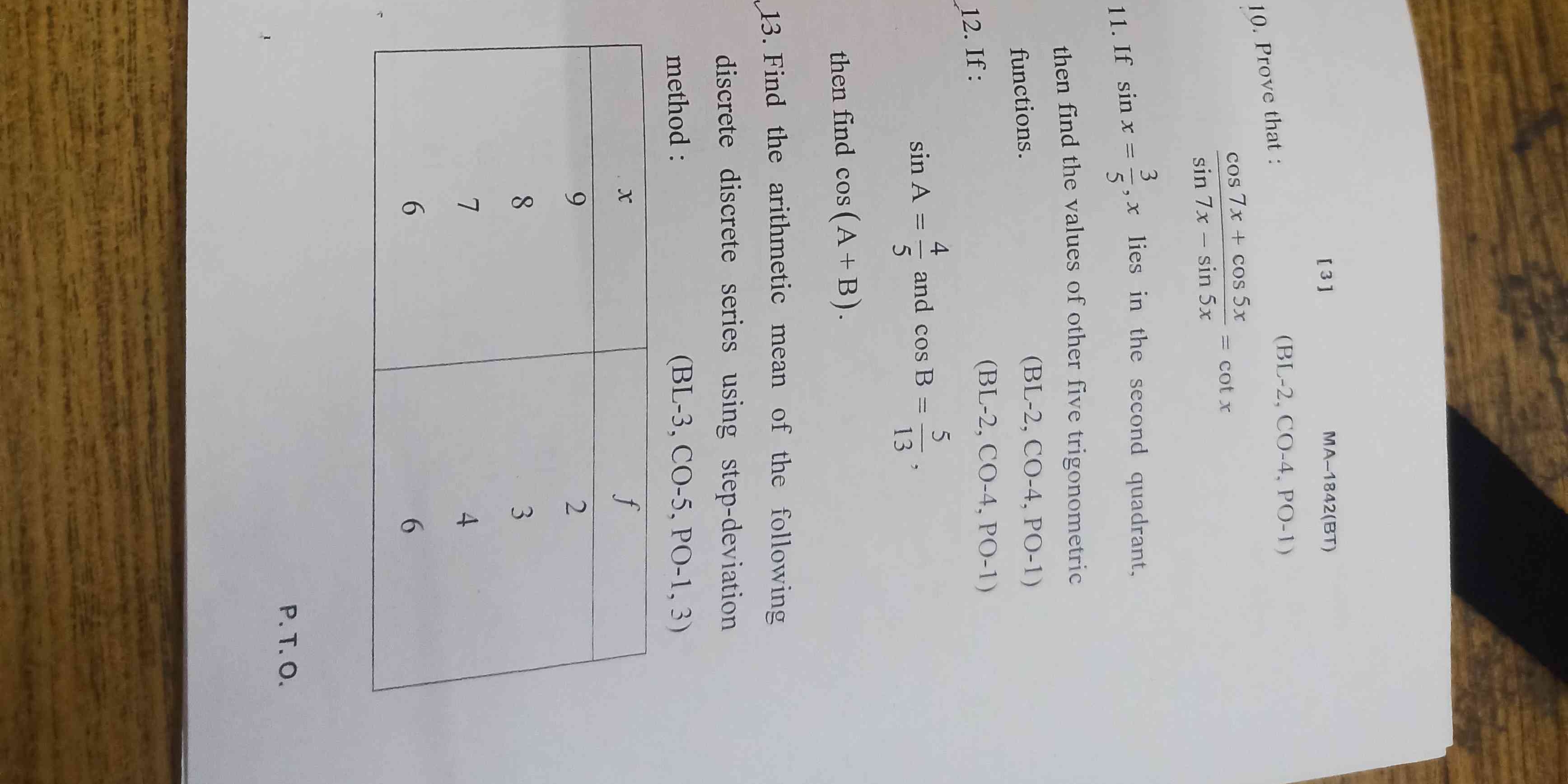If sin A = 4/5 and cos B = 5/13, then find cos(A + B). Also, find the arithmetic mean of the following discrete series using step-deviation method:

Understand the Problem
The question is asking to find the value of cos(A + B) given the sine and cosine values of angles A and B. It also requests to find the arithmetic mean of a discrete series using the step-deviation method based on the provided table.
Answer
$ \cos(A + B) = -\frac{33}{65} $ and the arithmetic mean = $ 7.75 $
Answer for screen readers
The value of $ \cos(A + B) = -\frac{33}{65} $ and the arithmetic mean is $ 7.75 $.
Steps to Solve
- Find cos A Given that $ \sin A = \frac{4}{5} $, we can find $ \cos A $ using the Pythagorean identity:
$$ \cos^2 A = 1 - \sin^2 A $$
Calculating:
$$ \cos^2 A = 1 - \left(\frac{4}{5}\right)^2 = 1 - \frac{16}{25} = \frac{9}{25} $$
Thus,
$$ \cos A = \sqrt{\frac{9}{25}} = \frac{3}{5} $$
- Find sin B Given that $ \cos B = \frac{5}{13} $, we can find $ \sin B $ using the Pythagorean identity:
$$ \sin^2 B = 1 - \cos^2 B $$
Calculating:
$$ \sin^2 B = 1 - \left(\frac{5}{13}\right)^2 = 1 - \frac{25}{169} = \frac{144}{169} $$
Thus,
$$ \sin B = \sqrt{\frac{144}{169}} = \frac{12}{13} $$
- Apply the cos(A + B) formula We use the angle addition formula for cosine:
$$ \cos(A + B) = \cos A \cos B - \sin A \sin B $$
Substituting the values we found:
$$ \cos(A + B) = \left(\frac{3}{5}\right)\left(\frac{5}{13}\right) - \left(\frac{4}{5}\right)\left(\frac{12}{13}\right) $$
Calculating each term:
$$ \cos(A + B) = \frac{15}{65} - \frac{48}{65} = \frac{15 - 48}{65} = \frac{-33}{65} $$
- Step-deviation method for the arithmetic mean Next, we calculate the arithmetic mean using the step-deviation method for the table provided:
| x | f |
|---|---|
| 6 | 2 |
| 7 | 3 |
| 8 | 4 |
| 9 | 2 |
| 10 | 1 |
- Calculate the total values First, find the total frequency $N$:
$$ N = 2 + 3 + 4 + 2 + 1 = 12 $$
- Find the mean Choose a suitable assumed mean, say $A = 8$.
Calculate deviations from the assumed mean and the weighted values ($d_i = x_i - A$):
- For $x=6$, $d_1 = 6 - 8 = -2$, with $f_1 = 2 \rightarrow f_1 d_1 = 2 \cdot (-2) = -4$
- For $x=7$, $d_2 = 7 - 8 = -1$, with $f_2 = 3 \rightarrow f_2 d_2 = 3 \cdot (-1) = -3$
- For $x=8$, $d_3 = 8 - 8 = 0$, with $f_3 = 4 \rightarrow f_3 d_3 = 4 \cdot 0 = 0$
- For $x=9$, $d_4 = 9 - 8 = 1$, with $f_4 = 2 \rightarrow f_4 d_4 = 2 \cdot 1 = 2$
- For $x=10$, $d_5 = 10 - 8 = 2$, with $f_5 = 1 \rightarrow f_5 d_5 = 1 \cdot 2 = 2$
Summing these values gives:
$$ \sum f_i d_i = -4 - 3 + 0 + 2 + 2 = -3 $$
Then compute the mean:
$$ \text{Mean} = A + \frac{\sum f_i d_i}{N} = 8 + \frac{-3}{12} = 8 - 0.25 = 7.75 $$
The value of $ \cos(A + B) = -\frac{33}{65} $ and the arithmetic mean is $ 7.75 $.
More Information
The calculation of $ \cos(A + B) $ uses the sine and cosine values of the given angles, showcasing the angle addition formulas. The arithmetic mean was determined using the step-deviation method, which simplifies the computation of means in grouped data.
Tips
- Forgetting to use the Pythagorean identities correctly when calculating sine or cosine.
- Misapplying the angle addition formulas or making arithmetic errors.
- Not correctly summing frequencies or weighted deviations in the step-deviation method.
AI-generated content may contain errors. Please verify critical information